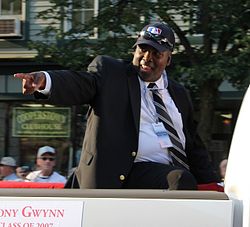By David Ogul


(Photo: Wikipedia)
SAN DIEGO –Mr. Padre is gone. The greatest hitter of our time and the most celebrated San Diego State Aztec ever is dead at 54. Tony Gwynn’s passing on Monday, June 16, from cancer caused by years of chewing smokeless tobacco has caused this city, this county, this region, to reflect on what it had and what it has lost. Much is being said and much is being written, but I find among the most poignant lessons from Mr. Gwynn’s life comes not from his 3,141 career hits, not from his .338 batting average over 20 seasons and not from his eight National League batting titles. I find among the most poignant lessons from Mr. Gwynn’s life comes not from his unbending decency, or from his leading a perennially hapless San Diego ball club to its only two World Series appearances in the team’s 45 years of existence.
I find among the most poignant lessons of Tony Gwynn’s life in the Torah.
No, Tony Gwynn was not Jewish. But Mr. Gwynn refused to compromise. He was dedicated to his craft. And he was satisfied with his lot in life, eschewing tens of millions of dollars – if not more – through free agency to stay in San Diego.
That Mr. Gwynn died this week – while we read from parshat Korach – is, to me, fascinating.
Korach, the Kabbalists say, was the reincarnation of Cain, whose offerings were rejected by G-d largely because they were the cheapest of Cain’s crop. Cain, the reasoning goes, was not willing to put in the effort needed to reach perfection.
The exact opposite of Tony Gwynn.
Tony Gwynn was the greatest hitter I’ve ever seen, and I’ve been watching baseball for a half century. Yet when he played at San Diego State University, no one expected him to have a Hall of Fame career with one of the highest lifetime batting averages in the Major League Baseball history. In fact, he was a better basketball player in college – he still holds several SDSU hoops records – and I was not alone in thinking at the time that he made a mistake by not pursuing an NBA career as a point guard instead of opting to sign with the Padres.
Mr. Gwynn’s achievements, though, came through a tireless work ethic. He was willing to put in the work, and he was renown for his endless study of his mechanics at the plate, the pitchers he faced and how he had fared against them in the past.
His drive went beyond hitting. When scouts concluded his glove was suspect, Mr. Gwynn worked on his fielding and would go on to win several Gold Glove awards. When scouts concluded he was far from fleet of foot, Mr. Gwynn worked on his base running skills and would go on to steal as many as 56 bases in a single season.
And unlike Korach, Mr. Gwynn – a privileged ballplayer – was perfectly satisfied with his lot in life, opting to stay in San Diego where he was revered, rather than collect tens of millions of more dollars via free agency.
Mr. Gwynn never led a rebellion and rarely complained. Compare that attitude to Korach, a privileged Levite who wanted more, wasn’t willing to sacrifice and was overcome by seething jealousy.
Many of my friends who may be reading this are probably scratching their head, wondering if I’ve gone off the proverbial deep end in drawing these comparisons between a guy famous for playing a child’s game with a key character in the Exodus. But if the Torah is the tree of life, and if it is to guide us in we conduct ourselves, then such analysis isn’t off base. Maybe the fact that Gwynn died as we read this week from parshat Korach isn’t a coincidence after all.
Tony Gwynn. The anti-Korach. Maybe that’s part of the reason San Diego loved him so much.
*
David Ogul is a lifelong Dodgers fan whose career in journalism spanned more than three decades and included work as a reporter and editor at some of Southern California’s larger daily newspapers. He now runs his own writing, editing and public relations company, Ogul Communications.
Pingback: In Tony Gwynn and Don Zimmer, baseball loses two of its best ambassadors – Washington Post - Sexxy Sports Network